Comprehensive Report: Using Numeracy and ICT Skills in Research
VerifiedAdded on 2023/06/04
|8
|1649
|281
Report
AI Summary
This report provides an overview of using numeracy and ICT skills in research, highlighting the importance of these skills in analyzing numerical trends, communicating globally, and solving problems. It discusses research methodologies, including inductive and deductive techniques, and emphasizes the systematic, controlled, empirical, and objective nature of scientific research. The report also addresses ethical principles in research, such as minimizing harm, ensuring confidentiality, obtaining informed consent, and avoiding deceptive tactics. Furthermore, it underscores the importance of validity, reliability, and independent review in ensuring the integrity of research findings. The conclusion emphasizes that research is a structured approach to answering questions and analyzing findings while adhering to ethical practices.
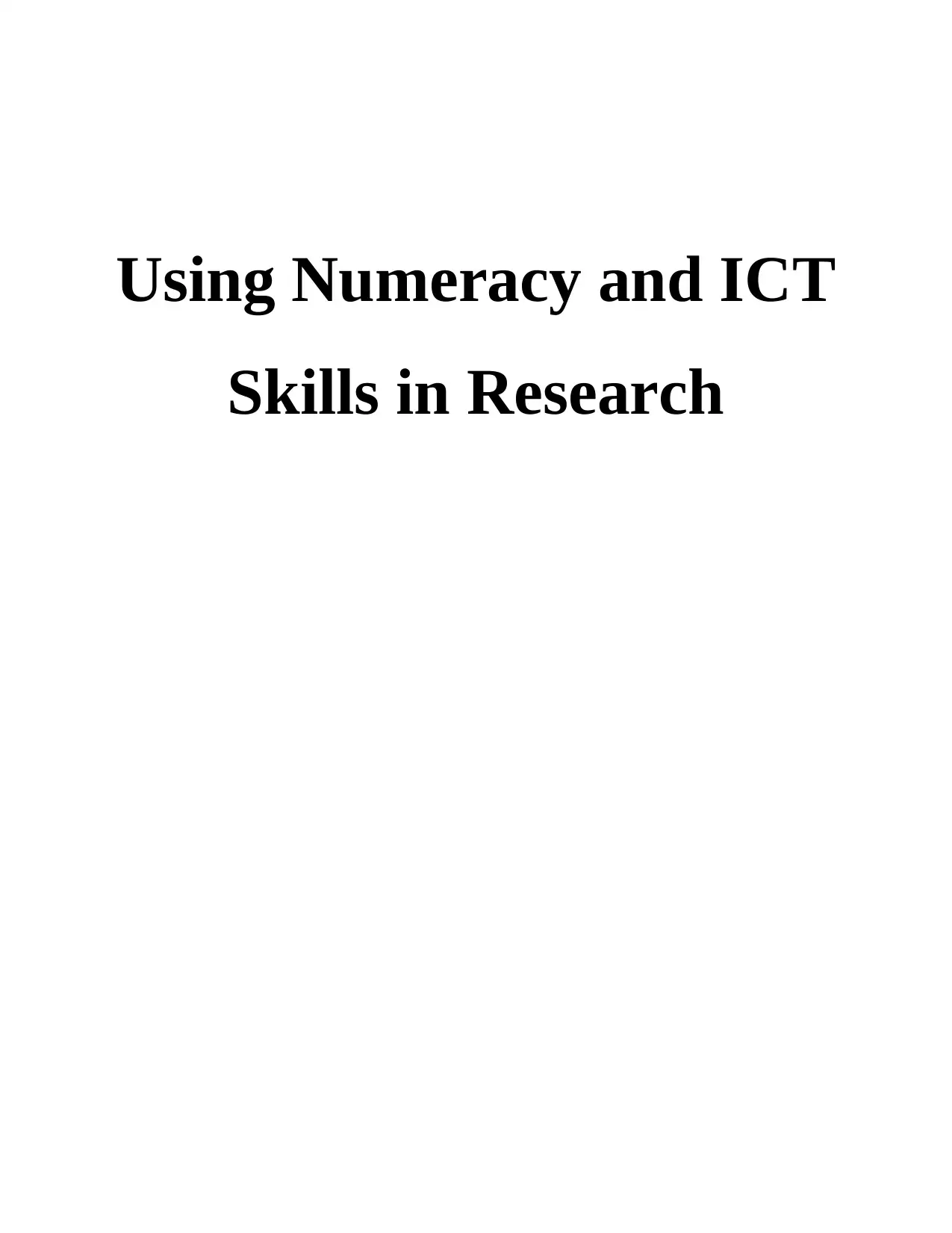
Using Numeracy and ICT
Skills in Research
Skills in Research
Paraphrase This Document
Need a fresh take? Get an instant paraphrase of this document with our AI Paraphraser


⊘ This is a preview!⊘
Do you want full access?
Subscribe today to unlock all pages.

Trusted by 1+ million students worldwide

Paraphrase This Document
Need a fresh take? Get an instant paraphrase of this document with our AI Paraphraser
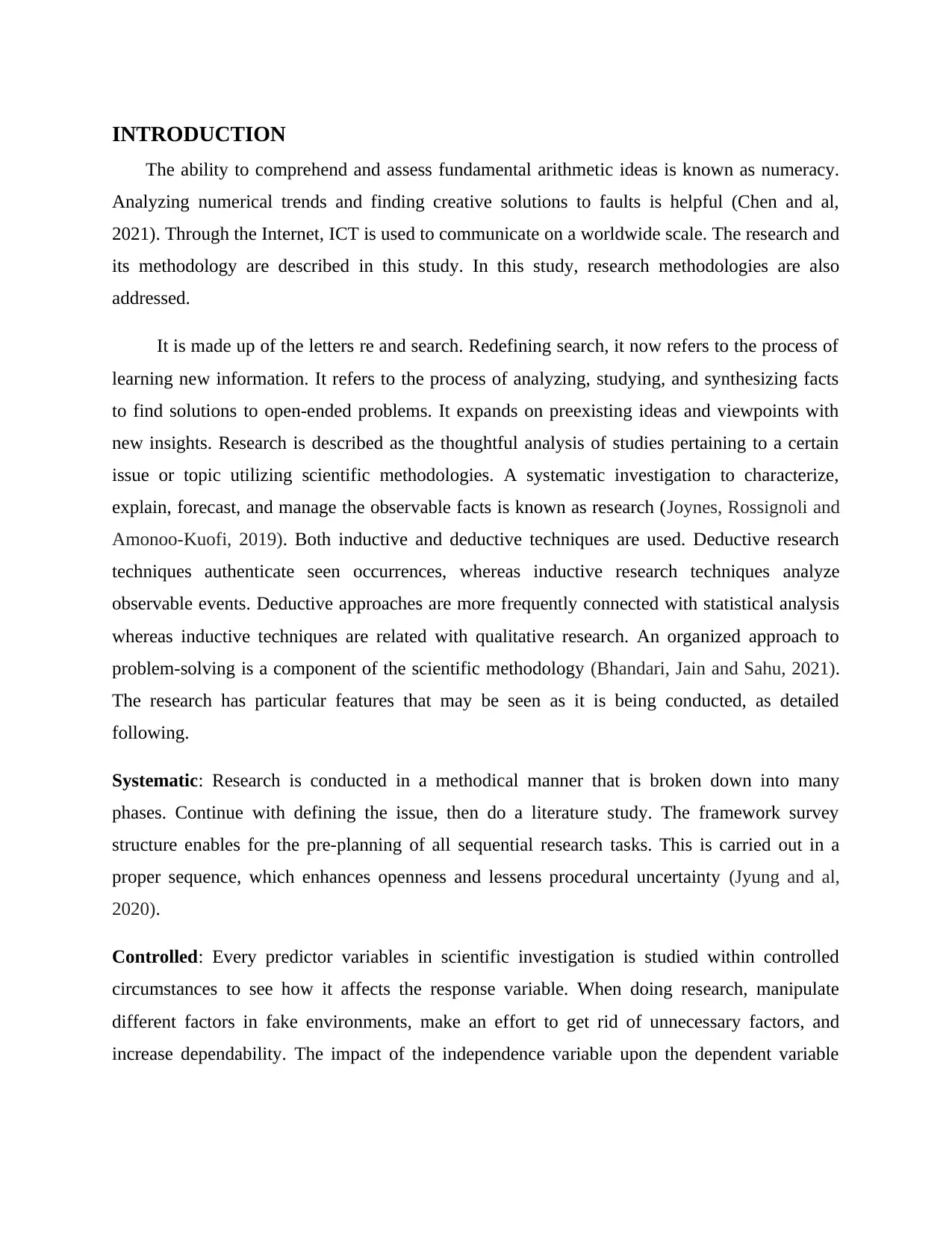
INTRODUCTION
The ability to comprehend and assess fundamental arithmetic ideas is known as numeracy.
Analyzing numerical trends and finding creative solutions to faults is helpful (Chen and al,
2021). Through the Internet, ICT is used to communicate on a worldwide scale. The research and
its methodology are described in this study. In this study, research methodologies are also
addressed.
It is made up of the letters re and search. Redefining search, it now refers to the process of
learning new information. It refers to the process of analyzing, studying, and synthesizing facts
to find solutions to open-ended problems. It expands on preexisting ideas and viewpoints with
new insights. Research is described as the thoughtful analysis of studies pertaining to a certain
issue or topic utilizing scientific methodologies. A systematic investigation to characterize,
explain, forecast, and manage the observable facts is known as research (Joynes, Rossignoli and
Amonoo-Kuofi, 2019). Both inductive and deductive techniques are used. Deductive research
techniques authenticate seen occurrences, whereas inductive research techniques analyze
observable events. Deductive approaches are more frequently connected with statistical analysis
whereas inductive techniques are related with qualitative research. An organized approach to
problem-solving is a component of the scientific methodology (Bhandari, Jain and Sahu, 2021).
The research has particular features that may be seen as it is being conducted, as detailed
following.
Systematic: Research is conducted in a methodical manner that is broken down into many
phases. Continue with defining the issue, then do a literature study. The framework survey
structure enables for the pre-planning of all sequential research tasks. This is carried out in a
proper sequence, which enhances openness and lessens procedural uncertainty (Jyung and al,
2020).
Controlled: Every predictor variables in scientific investigation is studied within controlled
circumstances to see how it affects the response variable. When doing research, manipulate
different factors in fake environments, make an effort to get rid of unnecessary factors, and
increase dependability. The impact of the independence variable upon the dependent variable
The ability to comprehend and assess fundamental arithmetic ideas is known as numeracy.
Analyzing numerical trends and finding creative solutions to faults is helpful (Chen and al,
2021). Through the Internet, ICT is used to communicate on a worldwide scale. The research and
its methodology are described in this study. In this study, research methodologies are also
addressed.
It is made up of the letters re and search. Redefining search, it now refers to the process of
learning new information. It refers to the process of analyzing, studying, and synthesizing facts
to find solutions to open-ended problems. It expands on preexisting ideas and viewpoints with
new insights. Research is described as the thoughtful analysis of studies pertaining to a certain
issue or topic utilizing scientific methodologies. A systematic investigation to characterize,
explain, forecast, and manage the observable facts is known as research (Joynes, Rossignoli and
Amonoo-Kuofi, 2019). Both inductive and deductive techniques are used. Deductive research
techniques authenticate seen occurrences, whereas inductive research techniques analyze
observable events. Deductive approaches are more frequently connected with statistical analysis
whereas inductive techniques are related with qualitative research. An organized approach to
problem-solving is a component of the scientific methodology (Bhandari, Jain and Sahu, 2021).
The research has particular features that may be seen as it is being conducted, as detailed
following.
Systematic: Research is conducted in a methodical manner that is broken down into many
phases. Continue with defining the issue, then do a literature study. The framework survey
structure enables for the pre-planning of all sequential research tasks. This is carried out in a
proper sequence, which enhances openness and lessens procedural uncertainty (Jyung and al,
2020).
Controlled: Every predictor variables in scientific investigation is studied within controlled
circumstances to see how it affects the response variable. When doing research, manipulate
different factors in fake environments, make an effort to get rid of unnecessary factors, and
increase dependability. The impact of the independence variable upon the dependent variable
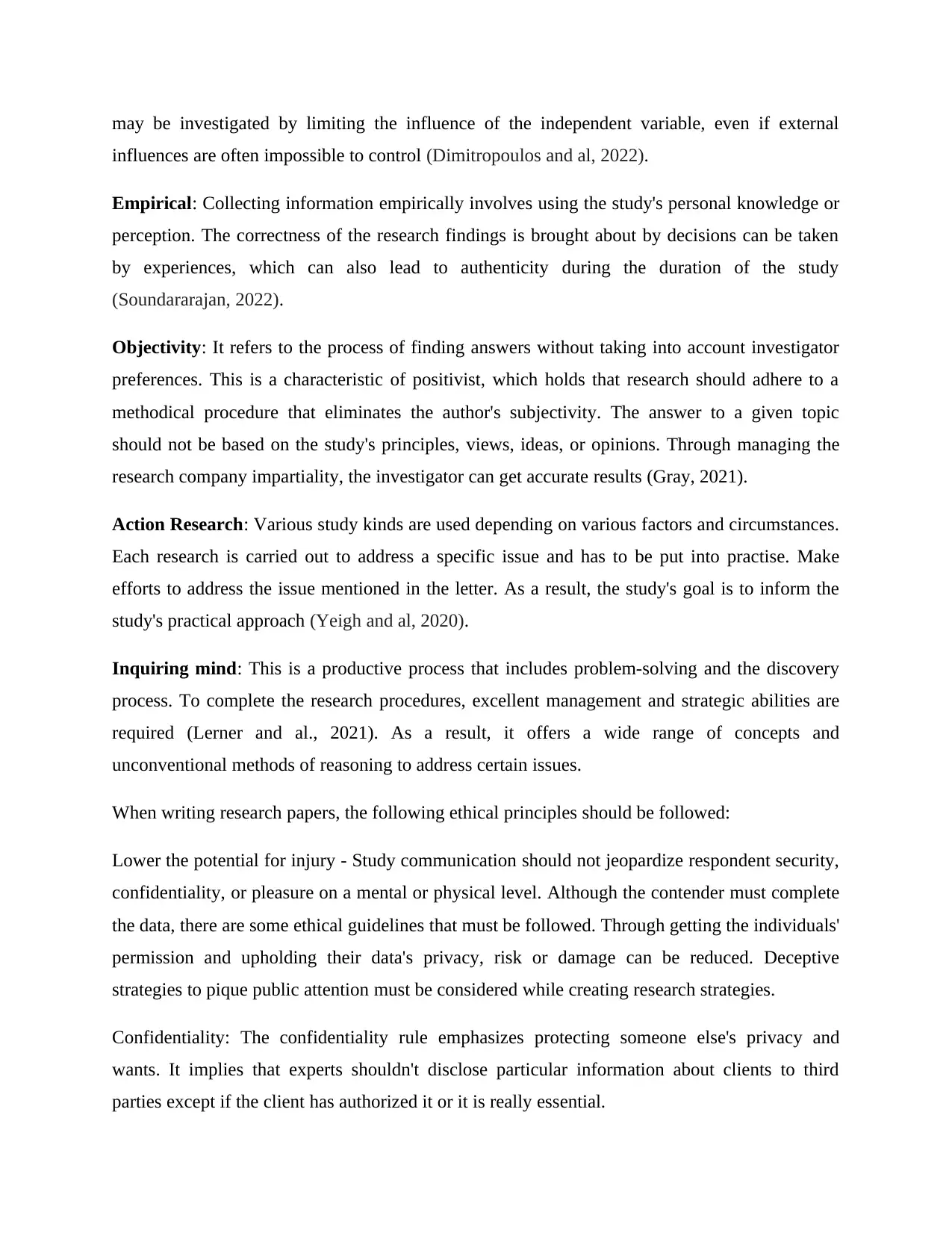
may be investigated by limiting the influence of the independent variable, even if external
influences are often impossible to control (Dimitropoulos and al, 2022).
Empirical: Collecting information empirically involves using the study's personal knowledge or
perception. The correctness of the research findings is brought about by decisions can be taken
by experiences, which can also lead to authenticity during the duration of the study
(Soundararajan, 2022).
Objectivity: It refers to the process of finding answers without taking into account investigator
preferences. This is a characteristic of positivist, which holds that research should adhere to a
methodical procedure that eliminates the author's subjectivity. The answer to a given topic
should not be based on the study's principles, views, ideas, or opinions. Through managing the
research company impartiality, the investigator can get accurate results (Gray, 2021).
Action Research: Various study kinds are used depending on various factors and circumstances.
Each research is carried out to address a specific issue and has to be put into practise. Make
efforts to address the issue mentioned in the letter. As a result, the study's goal is to inform the
study's practical approach (Yeigh and al, 2020).
Inquiring mind: This is a productive process that includes problem-solving and the discovery
process. To complete the research procedures, excellent management and strategic abilities are
required (Lerner and al., 2021). As a result, it offers a wide range of concepts and
unconventional methods of reasoning to address certain issues.
When writing research papers, the following ethical principles should be followed:
Lower the potential for injury - Study communication should not jeopardize respondent security,
confidentiality, or pleasure on a mental or physical level. Although the contender must complete
the data, there are some ethical guidelines that must be followed. Through getting the individuals'
permission and upholding their data's privacy, risk or damage can be reduced. Deceptive
strategies to pique public attention must be considered while creating research strategies.
Confidentiality: The confidentiality rule emphasizes protecting someone else's privacy and
wants. It implies that experts shouldn't disclose particular information about clients to third
parties except if the client has authorized it or it is really essential.
influences are often impossible to control (Dimitropoulos and al, 2022).
Empirical: Collecting information empirically involves using the study's personal knowledge or
perception. The correctness of the research findings is brought about by decisions can be taken
by experiences, which can also lead to authenticity during the duration of the study
(Soundararajan, 2022).
Objectivity: It refers to the process of finding answers without taking into account investigator
preferences. This is a characteristic of positivist, which holds that research should adhere to a
methodical procedure that eliminates the author's subjectivity. The answer to a given topic
should not be based on the study's principles, views, ideas, or opinions. Through managing the
research company impartiality, the investigator can get accurate results (Gray, 2021).
Action Research: Various study kinds are used depending on various factors and circumstances.
Each research is carried out to address a specific issue and has to be put into practise. Make
efforts to address the issue mentioned in the letter. As a result, the study's goal is to inform the
study's practical approach (Yeigh and al, 2020).
Inquiring mind: This is a productive process that includes problem-solving and the discovery
process. To complete the research procedures, excellent management and strategic abilities are
required (Lerner and al., 2021). As a result, it offers a wide range of concepts and
unconventional methods of reasoning to address certain issues.
When writing research papers, the following ethical principles should be followed:
Lower the potential for injury - Study communication should not jeopardize respondent security,
confidentiality, or pleasure on a mental or physical level. Although the contender must complete
the data, there are some ethical guidelines that must be followed. Through getting the individuals'
permission and upholding their data's privacy, risk or damage can be reduced. Deceptive
strategies to pique public attention must be considered while creating research strategies.
Confidentiality: The confidentiality rule emphasizes protecting someone else's privacy and
wants. It implies that experts shouldn't disclose particular information about clients to third
parties except if the client has authorized it or it is really essential.
⊘ This is a preview!⊘
Do you want full access?
Subscribe today to unlock all pages.

Trusted by 1+ million students worldwide
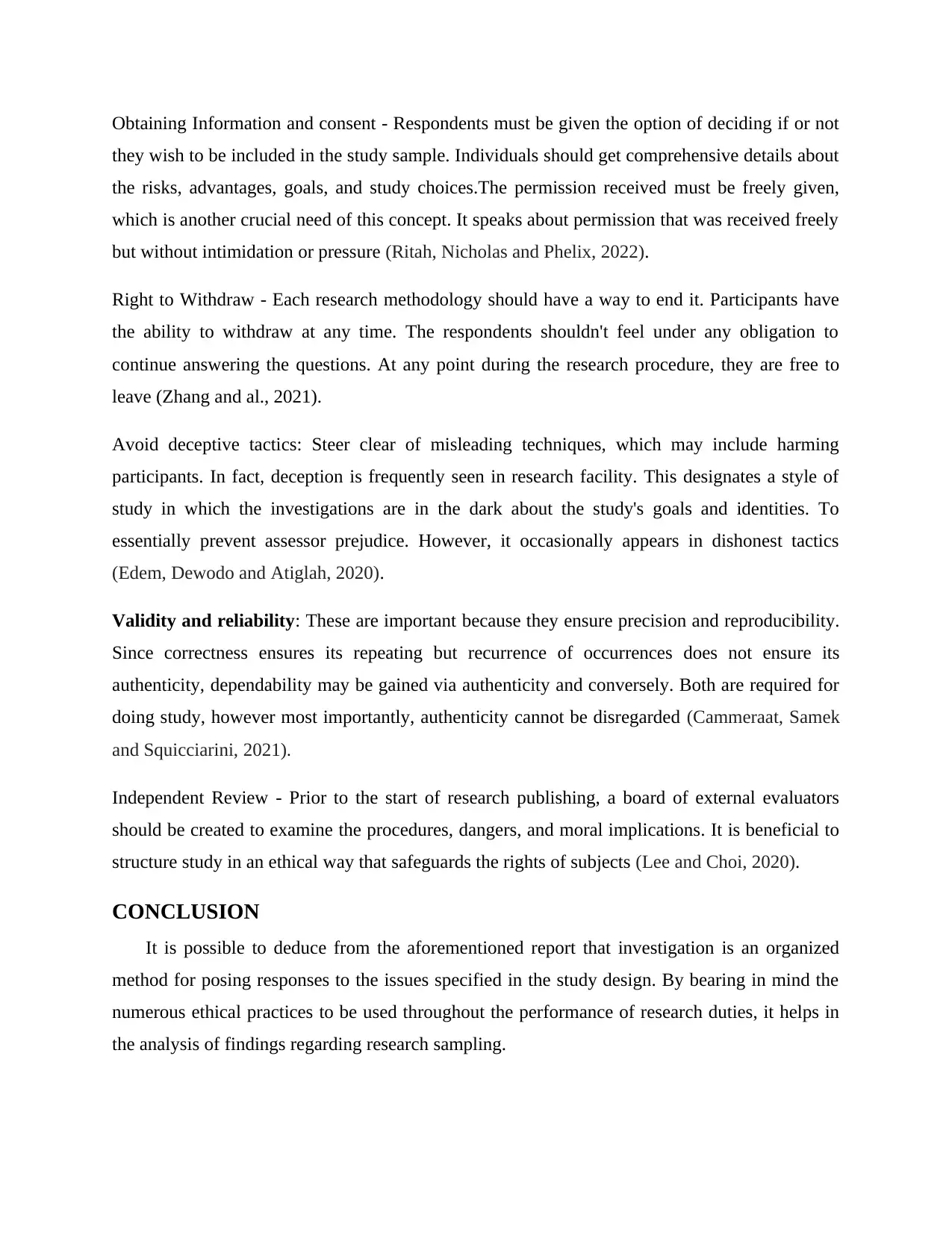
Obtaining Information and consent - Respondents must be given the option of deciding if or not
they wish to be included in the study sample. Individuals should get comprehensive details about
the risks, advantages, goals, and study choices.The permission received must be freely given,
which is another crucial need of this concept. It speaks about permission that was received freely
but without intimidation or pressure (Ritah, Nicholas and Phelix, 2022).
Right to Withdraw - Each research methodology should have a way to end it. Participants have
the ability to withdraw at any time. The respondents shouldn't feel under any obligation to
continue answering the questions. At any point during the research procedure, they are free to
leave (Zhang and al., 2021).
Avoid deceptive tactics: Steer clear of misleading techniques, which may include harming
participants. In fact, deception is frequently seen in research facility. This designates a style of
study in which the investigations are in the dark about the study's goals and identities. To
essentially prevent assessor prejudice. However, it occasionally appears in dishonest tactics
(Edem, Dewodo and Atiglah, 2020).
Validity and reliability: These are important because they ensure precision and reproducibility.
Since correctness ensures its repeating but recurrence of occurrences does not ensure its
authenticity, dependability may be gained via authenticity and conversely. Both are required for
doing study, however most importantly, authenticity cannot be disregarded (Cammeraat, Samek
and Squicciarini, 2021).
Independent Review - Prior to the start of research publishing, a board of external evaluators
should be created to examine the procedures, dangers, and moral implications. It is beneficial to
structure study in an ethical way that safeguards the rights of subjects (Lee and Choi, 2020).
CONCLUSION
It is possible to deduce from the aforementioned report that investigation is an organized
method for posing responses to the issues specified in the study design. By bearing in mind the
numerous ethical practices to be used throughout the performance of research duties, it helps in
the analysis of findings regarding research sampling.
they wish to be included in the study sample. Individuals should get comprehensive details about
the risks, advantages, goals, and study choices.The permission received must be freely given,
which is another crucial need of this concept. It speaks about permission that was received freely
but without intimidation or pressure (Ritah, Nicholas and Phelix, 2022).
Right to Withdraw - Each research methodology should have a way to end it. Participants have
the ability to withdraw at any time. The respondents shouldn't feel under any obligation to
continue answering the questions. At any point during the research procedure, they are free to
leave (Zhang and al., 2021).
Avoid deceptive tactics: Steer clear of misleading techniques, which may include harming
participants. In fact, deception is frequently seen in research facility. This designates a style of
study in which the investigations are in the dark about the study's goals and identities. To
essentially prevent assessor prejudice. However, it occasionally appears in dishonest tactics
(Edem, Dewodo and Atiglah, 2020).
Validity and reliability: These are important because they ensure precision and reproducibility.
Since correctness ensures its repeating but recurrence of occurrences does not ensure its
authenticity, dependability may be gained via authenticity and conversely. Both are required for
doing study, however most importantly, authenticity cannot be disregarded (Cammeraat, Samek
and Squicciarini, 2021).
Independent Review - Prior to the start of research publishing, a board of external evaluators
should be created to examine the procedures, dangers, and moral implications. It is beneficial to
structure study in an ethical way that safeguards the rights of subjects (Lee and Choi, 2020).
CONCLUSION
It is possible to deduce from the aforementioned report that investigation is an organized
method for posing responses to the issues specified in the study design. By bearing in mind the
numerous ethical practices to be used throughout the performance of research duties, it helps in
the analysis of findings regarding research sampling.
Paraphrase This Document
Need a fresh take? Get an instant paraphrase of this document with our AI Paraphraser
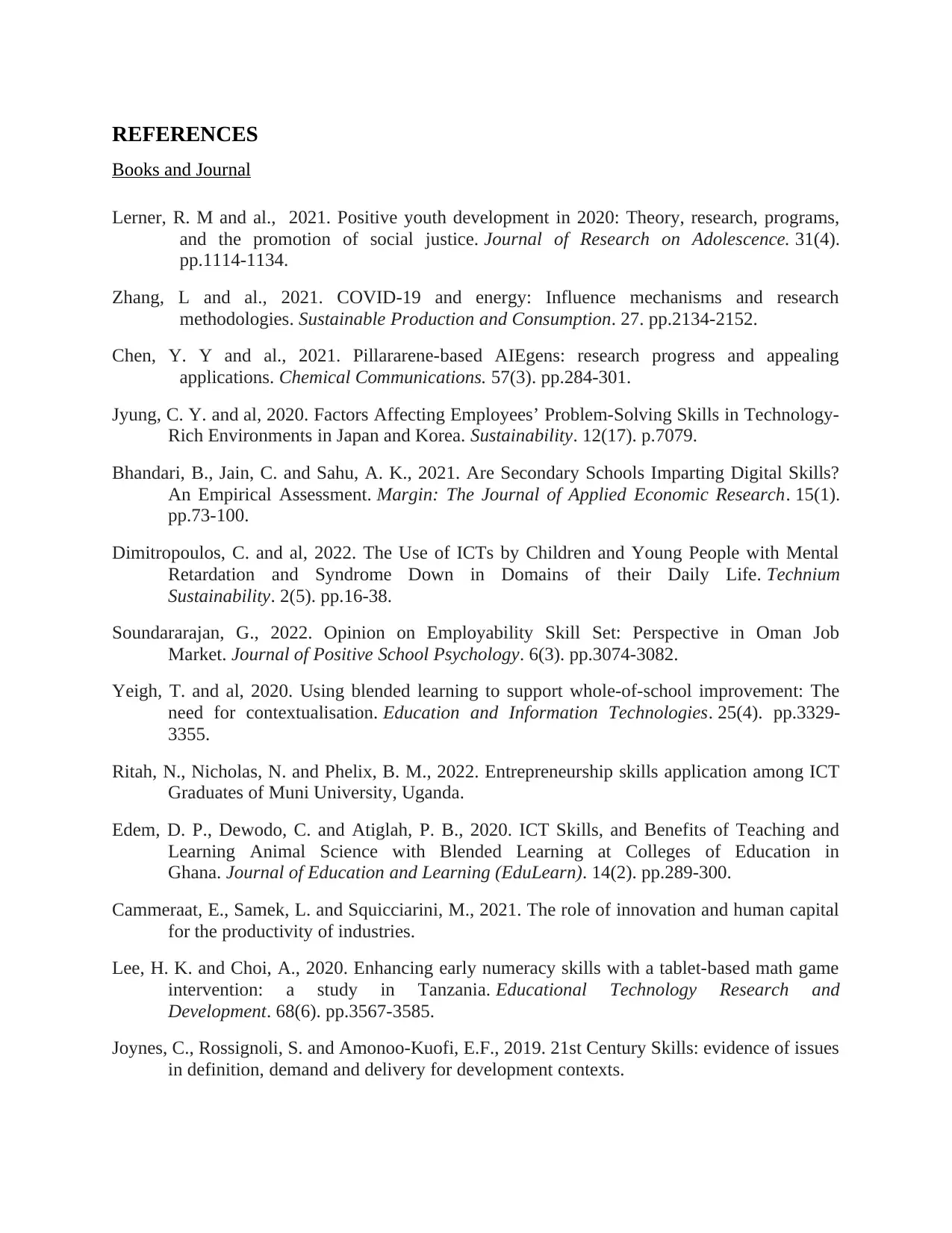
REFERENCES
Books and Journal
Lerner, R. M and al., 2021. Positive youth development in 2020: Theory, research, programs,
and the promotion of social justice. Journal of Research on Adolescence. 31(4).
pp.1114-1134.
Zhang, L and al., 2021. COVID-19 and energy: Influence mechanisms and research
methodologies. Sustainable Production and Consumption. 27. pp.2134-2152.
Chen, Y. Y and al., 2021. Pillararene-based AIEgens: research progress and appealing
applications. Chemical Communications. 57(3). pp.284-301.
Jyung, C. Y. and al, 2020. Factors Affecting Employees’ Problem-Solving Skills in Technology-
Rich Environments in Japan and Korea. Sustainability. 12(17). p.7079.
Bhandari, B., Jain, C. and Sahu, A. K., 2021. Are Secondary Schools Imparting Digital Skills?
An Empirical Assessment. Margin: The Journal of Applied Economic Research. 15(1).
pp.73-100.
Dimitropoulos, C. and al, 2022. The Use of ICTs by Children and Young People with Mental
Retardation and Syndrome Down in Domains of their Daily Life. Technium
Sustainability. 2(5). pp.16-38.
Soundararajan, G., 2022. Opinion on Employability Skill Set: Perspective in Oman Job
Market. Journal of Positive School Psychology. 6(3). pp.3074-3082.
Yeigh, T. and al, 2020. Using blended learning to support whole-of-school improvement: The
need for contextualisation. Education and Information Technologies. 25(4). pp.3329-
3355.
Ritah, N., Nicholas, N. and Phelix, B. M., 2022. Entrepreneurship skills application among ICT
Graduates of Muni University, Uganda.
Edem, D. P., Dewodo, C. and Atiglah, P. B., 2020. ICT Skills, and Benefits of Teaching and
Learning Animal Science with Blended Learning at Colleges of Education in
Ghana. Journal of Education and Learning (EduLearn). 14(2). pp.289-300.
Cammeraat, E., Samek, L. and Squicciarini, M., 2021. The role of innovation and human capital
for the productivity of industries.
Lee, H. K. and Choi, A., 2020. Enhancing early numeracy skills with a tablet-based math game
intervention: a study in Tanzania. Educational Technology Research and
Development. 68(6). pp.3567-3585.
Joynes, C., Rossignoli, S. and Amonoo-Kuofi, E.F., 2019. 21st Century Skills: evidence of issues
in definition, demand and delivery for development contexts.
Books and Journal
Lerner, R. M and al., 2021. Positive youth development in 2020: Theory, research, programs,
and the promotion of social justice. Journal of Research on Adolescence. 31(4).
pp.1114-1134.
Zhang, L and al., 2021. COVID-19 and energy: Influence mechanisms and research
methodologies. Sustainable Production and Consumption. 27. pp.2134-2152.
Chen, Y. Y and al., 2021. Pillararene-based AIEgens: research progress and appealing
applications. Chemical Communications. 57(3). pp.284-301.
Jyung, C. Y. and al, 2020. Factors Affecting Employees’ Problem-Solving Skills in Technology-
Rich Environments in Japan and Korea. Sustainability. 12(17). p.7079.
Bhandari, B., Jain, C. and Sahu, A. K., 2021. Are Secondary Schools Imparting Digital Skills?
An Empirical Assessment. Margin: The Journal of Applied Economic Research. 15(1).
pp.73-100.
Dimitropoulos, C. and al, 2022. The Use of ICTs by Children and Young People with Mental
Retardation and Syndrome Down in Domains of their Daily Life. Technium
Sustainability. 2(5). pp.16-38.
Soundararajan, G., 2022. Opinion on Employability Skill Set: Perspective in Oman Job
Market. Journal of Positive School Psychology. 6(3). pp.3074-3082.
Yeigh, T. and al, 2020. Using blended learning to support whole-of-school improvement: The
need for contextualisation. Education and Information Technologies. 25(4). pp.3329-
3355.
Ritah, N., Nicholas, N. and Phelix, B. M., 2022. Entrepreneurship skills application among ICT
Graduates of Muni University, Uganda.
Edem, D. P., Dewodo, C. and Atiglah, P. B., 2020. ICT Skills, and Benefits of Teaching and
Learning Animal Science with Blended Learning at Colleges of Education in
Ghana. Journal of Education and Learning (EduLearn). 14(2). pp.289-300.
Cammeraat, E., Samek, L. and Squicciarini, M., 2021. The role of innovation and human capital
for the productivity of industries.
Lee, H. K. and Choi, A., 2020. Enhancing early numeracy skills with a tablet-based math game
intervention: a study in Tanzania. Educational Technology Research and
Development. 68(6). pp.3567-3585.
Joynes, C., Rossignoli, S. and Amonoo-Kuofi, E.F., 2019. 21st Century Skills: evidence of issues
in definition, demand and delivery for development contexts.
1 out of 8
Related Documents
Your All-in-One AI-Powered Toolkit for Academic Success.
+13062052269
info@desklib.com
Available 24*7 on WhatsApp / Email
![[object Object]](/_next/static/media/star-bottom.7253800d.svg)
Unlock your academic potential
Copyright © 2020–2026 A2Z Services. All Rights Reserved. Developed and managed by ZUCOL.



